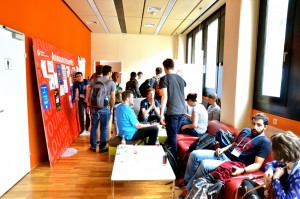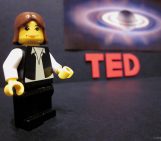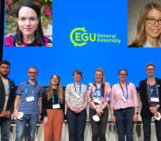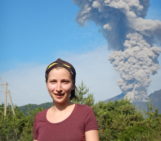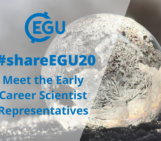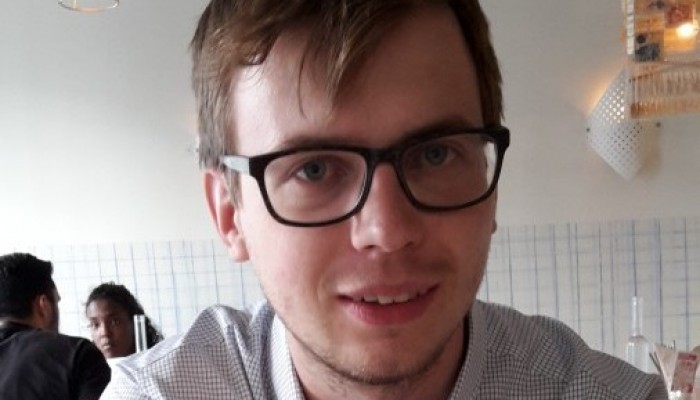
The EGU offers a platform for early career scientists (ECS) to become involved in interdisciplinary research in the Earth, planetary and space sciences, through sessions, social events and short courses at the annual General Assembly in April. One of the ways of ensuring that the voice of the Union’s ECS membership is heard is via the division early career scientist representatives.
Feedback gathered by the division representatives is collected by the Union level representative, who takes it to the EGU’s Programme Committee (PC) – the group responsible for organising the EGU’s annual General Assembly and the EGU Council – which is in charge of the overall management of the Union. At the 2015 General Assembly (GA), Wouter Berghuijs, took on the role of union level Early Career Scientist Representative; a post he will hold until April 2016. In this instalment of GeoTalk, Wouter will tell us more about the ECS membership and how he hopes to make a difference to the community during his one-year term.
Before we get stuck in, could you introduce yourself and tell us a little more about yourself and your career?
My name is Wouter Berghuijs. I am a PhD student in Hydrology at the University of Bristol (UK). Prior to moving to Bristol, I gained an MSc and BSc in Civil Engineering at Delft University of Technology (The Netherlands). During my MSc, I spent three months at the University of Illinois at Urbana-Champaign (USA) for a research stay, and a further three months at the University of Bristol. I have been involved with the EGU since 2013, first as the Young Scientist Representative for the Hydrology Division, and since the GA in 2015 as the Union-wide Early Career Scientist Representative (editors note – Council approved having the newly elected representative to have a Union-wide role, rather than just represent the ECS membership at the Programme Committee level).
In my day-to-day research I am interested in what factors drive hydrological differences between places. Instead of studying one place in detail, I compare several hundred catchments (surface area that drains rainfall into a river, lake or reservoir) located in different landscapes and climatic regions. The aspects of hydrologic behaviour I look at can range from floods to droughts, and from short-term dynamics to multi-decadal averages. With a large part of hydrological science consisting of case-studies at individual locations, findings are difficult to transfers to other places. The comparative approach brings in opportunities to develop generalisations and expose patterns that would not be observed when a single catchment is studied in isolation.
For those readers who might not be so familiar with the Union’s ECS membership, could you explain the main idea behind it and your role as Union Level Early Career Scientist Representative?
Approximately one quarter of the Unions’ membership consists of scientists in the early stages of their career. EGU wants to provide support to this group, which has different needs compared to more established scientists. Therefore EGU supports these members by providing reduced conference fees, recognising outstanding students, awarding travel grants, organising short-courses, arranging networking possibilities and more.
Instead of going for a top-down (senior members decide all) approach, EGU decided to appoint Early Career Scientists Representatives for all their scientific divisions. These representatives serve as the link between the ECS members and the board of the different divisions. It is their task to ensure ECS needs are met, both at the Assembly and throughout the year. Other ECS members with questions, comments and thoughts can get in touch with them to ensure their opinion is represented within their division.
In my position of Union level Early Career Scientist Representative, I gather information from each of the division representatives and bring it to the EGU’s Programme Committee – the group responsible for organising the EGU’s annual General Assembly, and the Union’s Council – the board responsible for the overall management and control of the Union.
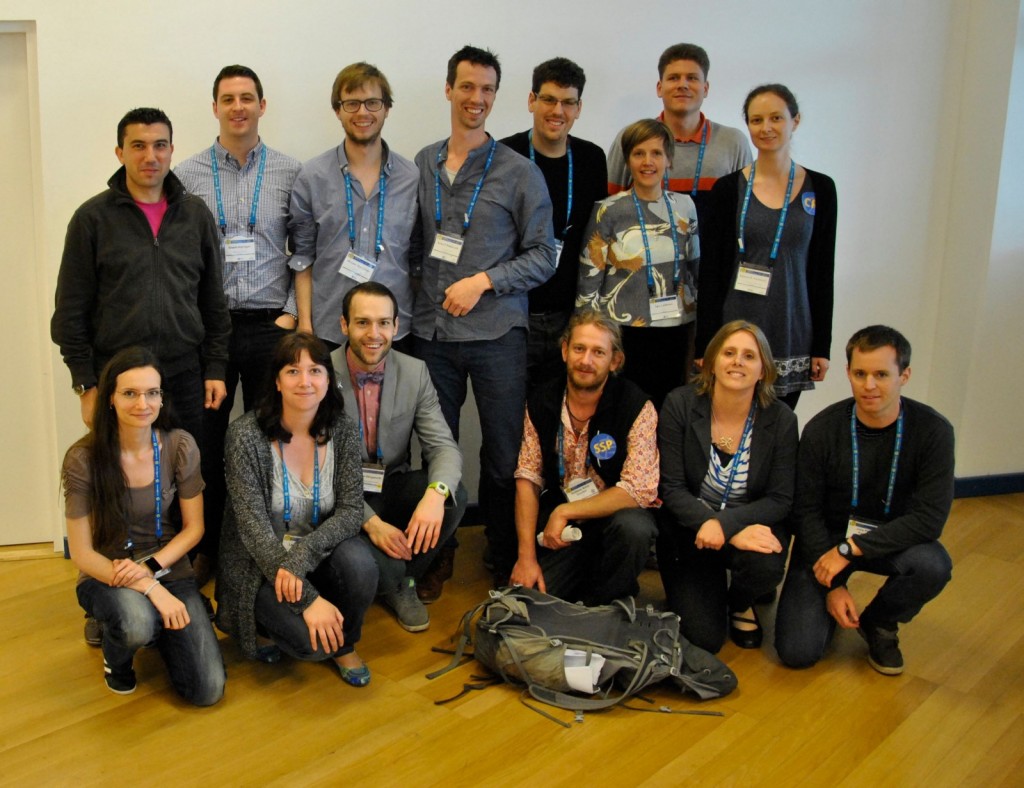
Some of the ECS Representatives at the 2014 General Assembly in Vienna. Top, from left to right, (in brackets, the Division they represent) : Matthew Agius (SM), Shaun Harrigan (HS), Wouter Berghuijs (ECS Representative), Roelof Rietbroek (G), Matthias Vanmaercke (SSS), Auguste Gires (NP), Nanna B. Karlsson (CR), Bottom (left to right): Ina Plesa (GD), Lena Noack (PS and Deputy Union Level ECS PC Representative), Sam Illingworth (ECS PC Representative , 2013- 2015), Guilhem Douillet (SSP), Anne Pluymakers (TS), Jone Peter (stand-in for Beate Krøvel Humberset, ST).
Why do you feel passionately about the ECS community?
The nice part of working for the ECS community is that relatively small contributions can make huge difference to people’s research career. For example, the ability to attend a conference due to an awarded travel grant can be really important to meet other people in your field and create exposure for your research. It sounds somewhat cliché, but the ECS members are the future of geoscience. An investment now in one of these members can be important for the next 40 years.
Additionally, with the recent appointment of ECS representatives it is an interesting task to start shaping how these representatives can best contribute to the Union, and can make sure they voice the opinion of a broad group of ECS members. With a significant part of the members being ECS it is a nice challenge to change this group from being mostly consumers of activities, to explicitly having them contributing at an organisation level.
What is your vision for the EGU ECS community and how do you hope to drive change during your year long position?
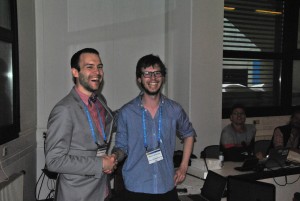
Sam Illingworth (on the left) handing over the batton of the ECS Community over to Wouter at the EGU General Assembly, 2014. Image Credit: Roelof Rietbroek, ECS Representative for the EGU Geodesy Division.
Last year Sam Illingworth was the PC Early Career Scientist Representative and made a great start to bringing all ECS together and voice their opinion to Council. My first task is to continue this work. The relative short appointment (1-year) makes it difficult to ensure both short-term and long-term improvements to the Union are made. Short-term improvements involve, for example, dealing with the feedback that provided suggestion for improvement of next years’s GA. During the year I have regular Skype meetings with all ECS representatives, and it is then my task to make sure the outcomes are discussed during e.g. the programme committee meeting (where the plans for the upcoming GA are usually set out), and council meeting later this year.
Recently, the name used to refer to early researchers across EGU was changed from Young Scientist to Early Career Scientists. Could you tell us a little more about what brought about that change and its significance?
One of the findings of the 2014 Young Scientist Survey and Forum at the GA was that early career scientist did not identify with the term young scientists due to the age connotations associated with the name. ECS benefits were considered important during the onset of academic career, independent of the age of the person. The ECS Representatives put together a proposal promoting for the name change which was brought to the EGU Council; who voted in favour of the renaming. It highlights the bottom-up nature of the organisation and how early stage scientists can make a difference in the Union.
The past General Assembly, saw a record number of short courses take place and the growth of networking opportunities and ECS specific activities. What further changes can the ECS look forward to for the 2016 conference?
The short courses and ECS specific activities have been very popular at this year’s EGU, and they are definitely a keeper. I don’t think these activities should increase in number, as it is not the intention to lure away the ECS from the regular parts of the scientific meeting; it is important that they also integrated as best as possible with the more established members of their divisions.
The goal for next year is mostly to maintain the activities that were a success, try a few new concepts for those sessions that didn’t work so well. There are also several improvements that can be made such as the capacity of the rooms of short courses and their timing compared to the rest of the programme.
How can those wanting to, get involved with the EGU?
EGU is a versatile organisation; besides organising their Annual General Assembly and running 17 peer-reviewed open access journals, EGU is busy with Topical meetings, education, and various forms of outreach. Because all these aspects are run by members there is always need for motivated people with refreshing ideas. If the ideas you have (or you want to develop) relate to your division, you should contact the respective ECS representative. If the ideas are broader ranging than your division, a good start is to contact me as the Union Level ECS representative.
You can also check the EGU volunteering pages, where you’ll find information on the helping out the EGU in their activities year round. Additionally, the EGU Blogs, from the EGU offical blog GeoLog, through to the Network and Division Blogs, welcome guest contributions; so if you’d like to report from an Earth science event, conference or fieldwork, or comment on the latest geoscientific developments and write about recently published findings in peer-reviewed journals you might consider sharing your thoughts on the Blogs. For more information or to submit a post, click here or get in touch with the EGU Communications Officer, Laura Roberts Artal.

